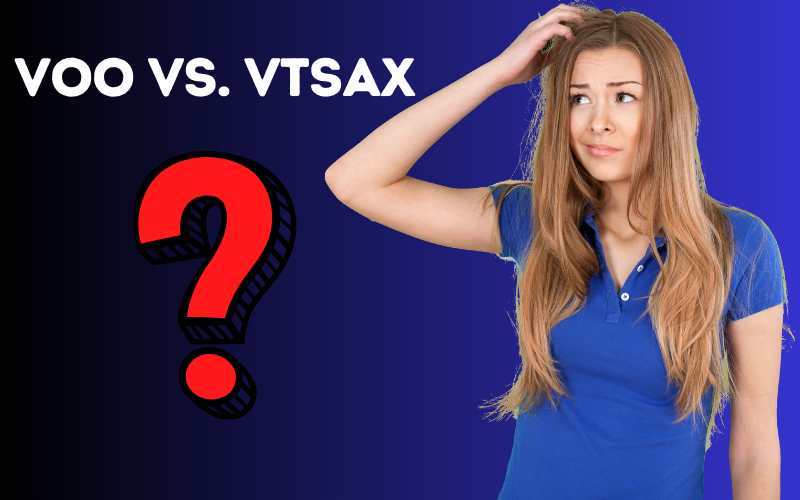When it comes to investing in the stock market, many people look for simple yet effective ways to grow their money. Two popular options are the Vanguard S&P 500 ETF (VOO) and the Vanguard Total Stock Market Index Fund (VTSAX). Both are great choices, but they have differences that might make one more suitable for your investment goals than the other. This article will compare VOO and VTSAX in detail, so you can decide which one is right for you.
What is VOO?
VOO stands for Vanguard S&P 500 ETF. An ETF is an Exchange-Traded Fund. VOO tracks the S&P 500 index. The S&P 500 includes 500 of the largest companies in the U.S. When you invest in VOO, you are investing in these 500 companies. Some of the companies include Apple, Microsoft, and Amazon.
What is VTSAX?
VTSAX stands for Vanguard Total Stock Market Index Fund. It is a mutual fund. VTSAX tracks the entire U.S. stock market. This includes small, medium, and large companies. When you invest in VTSAX, you are investing in the entire U.S. stock market.
Key Differences
- Scope of Investment
- VOO: Focuses on the top 500 companies in the U.S. These companies are large and well-established.
- VTSAX: Includes nearly 3,500 companies. This covers small, medium, and large companies.
- Type of Fund
- VOO: An ETF. It can be traded like a stock during market hours.
- VTSAX: A mutual fund. It is traded only once a day after the market closes.
- Management and Fees
- VOO: Has a low expense ratio. The expense ratio is 0.03%. This means for every $1,000 invested, you pay $0.30 in fees per year.
- VTSAX: Also has a low expense ratio, but slightly higher than VOO. The expense ratio is 0.04%.
- Minimum Investment
- VOO: No minimum investment. You can buy as little as one share.
- VTSAX: Requires a minimum investment of $3,000.
- Dividend Reinvestment
- VOO: Dividends can be reinvested, but you may need to set it up manually.
- VTSAX: Dividends are automatically reinvested unless you choose otherwise.
Performance
Both VOO and VTSAX have performed well over the years. Their performance depends on the overall U.S. stock market.
- VOO: Since it focuses on large companies, its performance is tied to how well these companies do. Historically, the S&P 500 has provided an average annual return of around 10%.
- VTSAX: Includes the entire stock market, so it benefits from the growth of small and medium companies too. Its historical performance is also close to the S&P 500, with an average annual return of around 10%.
Risk and Diversification
- VOO: Less diversified because it includes only large companies. If these companies face challenges, VOO’s performance can be affected.
- VTSAX: More diversified. It includes a wide range of companies from different sectors and sizes. This reduces the risk because if some companies perform poorly, others might do well.
Tax Efficiency
- VOO: Generally more tax-efficient. ETFs have a structure that minimizes capital gains taxes. When you sell ETF shares, you typically face fewer tax implications.
- VTSAX: Less tax-efficient compared to VOO. Mutual funds often distribute capital gains to investors, which can result in higher taxes.
Liquidity
- VOO: Highly liquid. You can buy and sell shares anytime during market hours. This makes it easier to manage your investments.
- VTSAX: Less liquid. Trades are executed once a day after the market closes. This can be less convenient if you need to access your money quickly.
Suitable for Different Investors
- VOO: Suitable for investors who prefer large, stable companies. Good for those who want the flexibility to trade during market hours. Ideal for those seeking tax efficiency.
- VTSAX: Suitable for investors who want broad market exposure. Good for those who can invest at least $3,000. Ideal for those who prefer automatic dividend reinvestment.
Which One is Better?
The answer depends on your investment goals and preferences.
- If you want to invest in large, established companies, VOO might be better. It offers low fees, high liquidity, and tax efficiency.
- If you want exposure to the entire U.S. stock market, VTSAX might be better. It provides broad diversification and automatic dividend reinvestment.
Conclusion
Both VOO and VTSAX are excellent investment options. They offer low fees and good returns. Your choice depends on your investment strategy. Consider your goals, risk tolerance, and preferences.
If you prefer large companies and want flexibility, choose VOO. If you want broad market exposure and can invest a minimum amount, choose VTSAX.
Remember, investing involves risks. It’s important to do your research and consider your financial situation before making a decision. Both VOO and VTSAX can be great additions to a diversified portfolio.
In summary, VOO and VTSAX are two strong options for long-term investors. They both provide access to the U.S. stock market with low fees. Your choice will depend on your specific needs and goals.
Frequently Asked Questions
1. What is the main difference between VOO and VTSAX?
- VOO is an ETF that tracks the S&P 500, focusing on the top 500 large-cap companies in the U.S. VTSAX is a mutual fund that tracks the entire U.S. stock market, including small, medium, and large-cap companies.
2. Which one has lower fees, VOO or VTSAX?
- VOO has a slightly lower expense ratio at 0.03% compared to VTSAX’s 0.04%. This means VOO is marginally cheaper in terms of annual fees.
3. Can I invest in VTSAX with a small amount of money?
- No, VTSAX requires a minimum investment of $3,000. If you want to start with a smaller amount, VOO might be a better option since it has no minimum investment requirement.
4. How do VOO and VTSAX handle dividends?
- VOO allows for dividends to be reinvested, but you may need to set this up manually. VTSAX automatically reinvests dividends unless you choose otherwise.
5. Which fund is more tax-efficient, VOO or VTSAX?
- VOO is generally more tax-efficient due to its ETF structure, which minimizes capital gains distributions. VTSAX, being a mutual fund, may distribute capital gains more frequently, potentially leading to higher tax liabilities.



